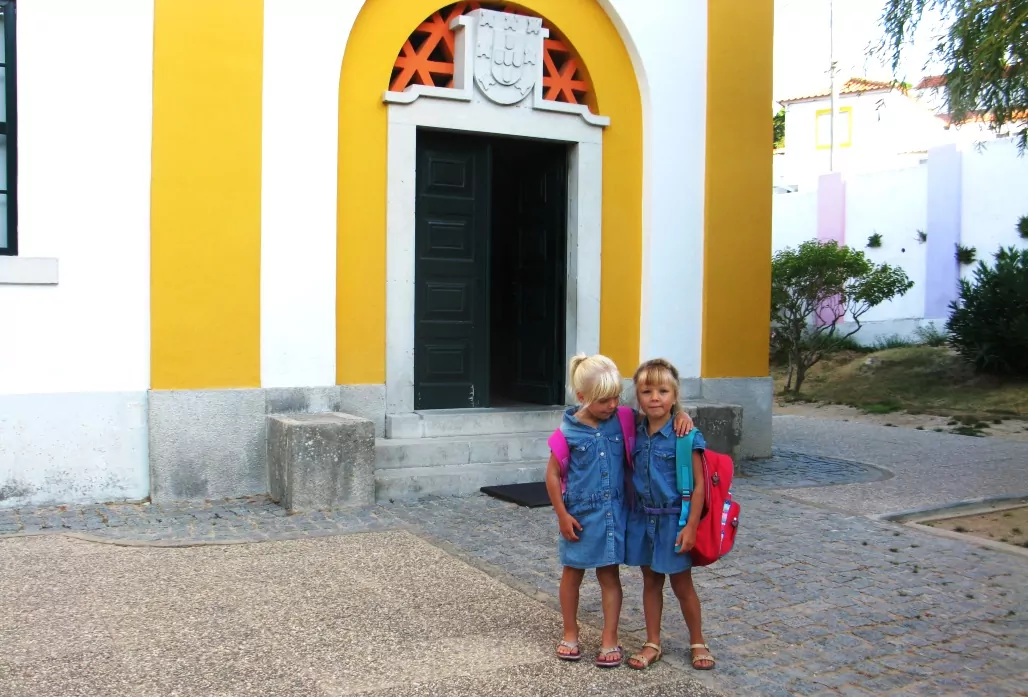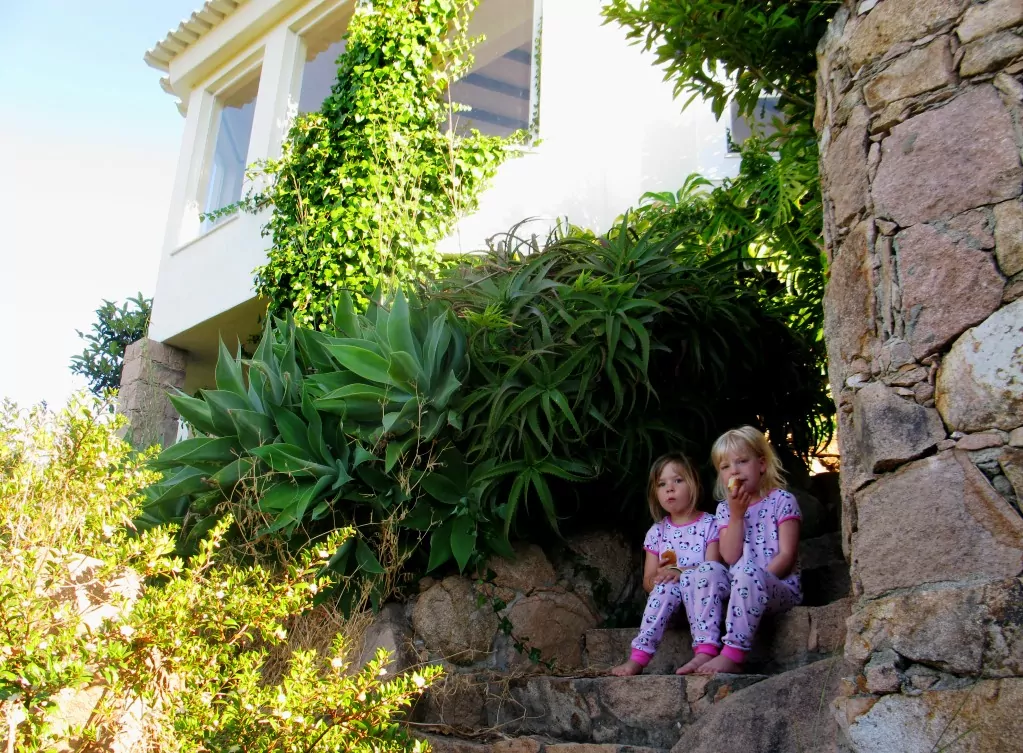Åsa Winald lives with her husband Sverker and their daughters Frida and Jonna in a small seaside village outside Lisbon, Portugal. The family moved from Sweden a few years ago because they wanted to find the best surfing waves and because they longed to get away - to Bortugal.
In fact, Asa's blog is called just that. On the blog Bortugal you can read about the family's fate and adventures in the new country, what it's like for the children to attend a Portuguese village school, how social life works in the village and how to live everyday life... in a completely different country. Of course, we are curious: how does it work to move abroad with the whole family?
Table of contents
How did you get the idea to move abroad and why did you choose Portugal?
Both Sverker and I have always been long distance travellers. Both had lived abroad for several years before we met. Me in Austria, Switzerland and Spain among others and Sverker in New Zealand. From the moment we met, we have been speculating about where the ideal place to live would be.
We decided to investigate Portugal as a potential country to move to as it is part of the EU, has great surf and a fantastic climate. The fact that the Portuguese are a very friendly people made it seem even more right. We made three trips here before we found our home and decided that it would be right here where we live now.
How do you live in Portugal and how has it been to get into the local life where you live?
On our third trip to Portugal we bought a house in a small village quite close to Lisbon overlooking the Atlantic Ocean, where we have been living for two and a half years now. The fact that we ended up in a village and that our children go to school in the village has definitely contributed to the fact that getting to know people and becoming involved in local life has gone beyond expectations.
Have you tried to learn Portuguese and how is it going?
I knew Spanish before, which helps. Spanish and Portuguese are about the same as Swedish and Danish. I started with language courses on CD and apps before we moved and managed to make myself understood quite well from the beginning with my Spanish-Ugric but had difficulty understanding what people said. Now I've been taking language classes twice a week for almost two years and recently took the DAPLE test, Advanced Portuguese as a Foreign Language, and think I passed it.
Sverker has only been on a language course for a few months, but he has picked up quite a lot too. There are some home-made sentences, but he manages to hold simple conversations with the neighbours and the children's friends and has a fairly large vocabulary. It has helped Sverker that so many Portuguese people (apart from old people and children) speak good English, but at the same time it has perhaps slowed down his Portuguese learning curve.
Do you work in Portugal or how do you support yourself?
We sold our house in Sweden and got good start-up capital, so so far we haven't had to work. I don't think it's realistic to move to Portugal and expect to find a job in the first place if you don't have very attractive skills.
It's not entirely realistic to think that we'll last forever without income either, but we've invested money in a project that will hopefully provide some return eventually. We are also thinking about some kind of bed & breakfast business, but are not there yet. We try to live frugally and make the money last as long as possible. Lots of soup and few restaurant visits!
How do the children feel at school and how does the Portuguese school compare to the Swedish one?
Portuguese schools are much more old-fashioned than Swedish schools. You have to think back a generation, with shameful behaviour if you don't behave, writing from year one and two years in each class if you don't meet the knowledge requirements. From a Swedish perspective, this is completely taboo and wrong, but after ten years as a secondary school teacher, I was not entirely convinced that Swedish schools are the ultimate either.
We were naturally worried about how it would go and it was nice to know that there was a Swedish school just half an hour away if it didn't work out, but it has actually exceeded our expectations. It is certainly not suitable for all children, but our children are enjoying it very much so far.
I think it was good that they did not have to jump into it in the middle but were at the age (5 and 7) that they could start in year one and preschool class here. They started speaking Portuguese gradually after a few semesters and now they have even started mixing in Portuguese when they speak Swedish.

What about citizenship, healthcare and insurance when moving to Portugal?
Good question that I can only partially answer. When you move here, you have to register your residency at the nearest Cámara Municipal (town hall). After five years, if I understand correctly, you have to go to another body and renew your residency.
Since Portugal is part of the EU, you have the right to health care and education if you register here. However, as a non-citizen, you do not have the right to be a burden on the social security system. "To get healthcare here, you have to go to your Centro de Saúde, the health centre, and get a document to show at doctor's appointments and the like," says Åsa Winald.
The blue EU card expires when you move from Sweden, and as I understand it, you don't get any Portuguese as a non-Portuguese, which means you are not entitled to health care outside Portugal. Not even in Sweden! We have only good experiences with the Portuguese health care so far, but we still have a private insurance that covers some dental care and some other things just in case.
As for citizenship, I haven't researched how it works yet, but I know that you can get citizenship if you give birth here, which then becomes Portuguese and the citizenship is transferred to the parents. Unfortunately, I'm too old for that option! 😉
What are the best and worst things about living in Portugal?
The best part is the climate, the sea and the people. The Portuguese are nice and helpful and you are always treated with kindness. The climate is ideal. Long sunny summers without the stress of missing it or not being able to enjoy it.
Winter is short and fleeting like a Swedish summer, but more like autumn and spring than winter. Slightly more erratic weather and cooler temperatures, the ideal climate for being outdoors and exercising, and warm enough to eat lunch outdoors all year round as long as the sun comes out.
The worst thing about living in Portugal is that it is a country with an economy and labour market in crisis and very low wages. Right now it doesn't affect us so much, but if you think about the children, it may be that they are worse off here than in Sweden from a purely material point of view, but things can change and money isn't everything.
Finally, a question we ask everyone we interview: What is your dream destination, Åsa Winald?
I don't dream much about travelling anymore since we moved here. I don't really want to leave home, but I am a bit curious about the Azores. You can fly there from Lisbon for a few hundred dollars and I could probably imagine going there to hike, look for whales and bathe in hot springs!

Thank you Åsa Winald for sharing your experiences and thoughts!













Linnea says:
As usual, a nice Saturday interview 🙂 .
06 February 2016 - 10:32
anita wag agrimanaki says:
Good interview! I can imagine that maybe the right to healthcare works like in Greece. You have to work to have the right to healthcare. Here it is not enough just to be registered here or a Greek citizen. You have to work to get health insurance ...
06 February 2016 - 10:47
Kim says:
If you are resident in the new EU country, you can obtain a blue insurance card in the new country that is valid in the EU for emergency medical treatment.
06 February 2016 - 10:55
Åsa says:
Hi there! I actually put a campervan picture in today's post just for you! PS. Anita: We have the right to healthcare even though we don't work here. Strange that there are such different rules in the EU!
06 February 2016 - 11:00
Cat's Considerations says:
Nice interview.
06 February 2016 - 11:08
Mr Steve says:
A wonderfully laid-back interview. It makes me happy to "meet" people with such an approach to life.
06 February 2016 - 10:11
Ama de casa says:
It's great to see people who have a dare-to-win attitude.
06 February 2016 - 11:11
admin says:
Steve, right? We met Åsa and Sverker when we were in Portugal during the European trip and we were also happy about that meeting 🙂 .
Linnea, glad you like our interviews! 🙂
Anita, oh how interesting when other expats can advise and/or compare rules in different countries!
Kim, thanks for the interesting comment, let's see what Åsa has to say about it?
Åsa, oh a caravan picture just for our would! Not bad 🙂 I will look in of course! By the way, maybe you missed Kim's comment above (I approved it after you wrote your reply).
Katta, glad you liked the interview! 🙂
Ama de casa, right? It is inspiring to meet such people! 🙂
06 February 2016 - 11:22
nils-åke hansson says:
Interesting to learn about their lives.
06 February 2016 - 11:38
Åsa says:
Kim: It doesn't quite work that way unfortunately. There seems to be a gap in the system. It seems that you have to work in the country to get the blue card that gives you the right to health care in other EU countries, but here you get health care if you get the document from the Centro de Saúde.
06 February 2016 - 11:43
Lennart says:
Portugal is a country we really like.
Good food with fantastic ingredients and nice people!
06 February 2016 - 11:53
Ditte says:
Thank you for another interesting and rewarding interview. I really like the mix of interviews you have.
It's nice to read about what life is like for the family with children, everyday life and school.
06 February 2016 - 12:18
Elisabeth says:
What a great interview! They have really found their home!
06 February 2016 - 13:56
Role o Carina says:
How nice it sounds and that they enjoy the nice climate!
Portugal looks like a great place to spend the winter with your campervan!
This will probably be the case in a few years 🙂
Take care......
06 February 2016 - 15:04
Lena in Wales says:
Nice interview! Always good to hear about the lives of other expatriate Swedes.
06 February 2016 - 16:08
admin says:
Nils-Åke, glad you enjoyed the interview!
Lennart, agree that Portugal is nice, we had a great time there last year in the motorhome!
Ditte, glad to hear you like the mix of interviews! We try to mix people with different perspectives and experiences when it comes to travelling, camping, motorhomes, living abroad, etc.
Elisabeth, glad you liked the interview! 🙂
Rolle and Carina, we spent January in Portugal with the motorhome last year. Very nice climate then!
Lena in Wales, glad you enjoyed the interview! 🙂
06 February 2016 - 16:16
anita wag agrimanaki says:
a little extra comment from me - I misunderstood a bit about health care hence my previous comment..sorry. (ps - yes Greece has not funny rules for those who are without health insurance)
06 February 2016 - 16:28
BP says:
A great interview! I have also moved abroad for a while, but daring to buy a house without having an income is big. They really have the right attitude - like it always works out, which it actually does.
06 February 2016 - 18:08
Mary of Rövarhamn says:
Lovely, Åsa! So bloody right. And the Azores are fantastic. Greener than greenest. Hugs. /Linda
06 February 2016 - 23:27
Ruth in Virginia says:
It is really nice to read about people who are happy where they are.
and live in the moment, instead of planning new trips, almost,
before they return home. But you have to remember that
this couple travelled a lot, before they found their paradise!
and trying to fit into the new conditions. Admirable!
07 February 2016 - 5:55
admin says:
Anita, I remember reading about the healthcare system on your blog before, and there are many people who do not have it easy in Greece....
BP, so glad you like the interview! I am always inspired by people who dare! 🙂
Mary af Rövarhamn, the Azores sounds like a fantastic place 🙂 .
Ruth in Virginia, isn't it great to have found home and enjoy where you are! We are probably a bit restless then who like to travel, even though we also feel fine in the houseboat 😉.
07 February 2016 - 9:23
clear says:
Which village is it? Looks to be in a good location, lives in Estoril but is considering a house in a village near the Lisbon area.
07 February 2016 - 11:36
Solan says:
What a family, impressed by everyone who despite having children goes off to something new. Portugal does not have a Swedish/Norwegian colony like those in Spain. With Swedish schools etc.
07 February 2016 - 12:19
admin says:
Claes, we'll see if Åsa pops in and can answer that 😉.
Solan, no, Portugal does not have "Swedish colonies" in the same way as Spain as far as I know, not to the same extent anyway. But there is apparently a Swedish school (even if Åsas children do not go to it).
07 February 2016 - 17:34
Maria says:
So inspiring! 🙂
07 February 2016 - 19:07
Åsa says:
Claes, email me at asa @bortugal.se if you want to know more about our village. It's not a secret which village we live in, it's not too hard to figure out if you have a little local knowledge and read my blog, but I've never written out the name of the village other than in response to an individual person's individual enquiry, so I won't answer it here. But if you email...
07 February 2016 - 23:44
Steel city anna says:
Interesting reading, and strange that there are so many different rules within the EU.
10 February 2016 - 15:45
Mr Tomas says:
Yesterday I saw an old episode of Arga Snickaren where he helped Sverker and Åsa to get their house construction back on track. The programme was from 2009 and I wondered how it went for the couple...!
The article above is from 2016, but according to their blog (link in the article, recommended), they still live there... 🙂 ).
13 February 2020 - 15:26